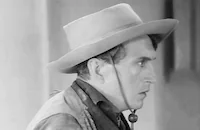Cahill, U.S. Marshal

Brief Synopsis
Cast & Crew
Andrew V. Mclaglen
John Wayne
Gary Grimes
George Kennedy
Neville Brand
Hank Worden
Film Details
Technical Specs
Synopsis
After tracking down a gang of outlaws, lawman J.D. Cahill returns to town and discovers that the local bank has been robbed. The sheriff and the deputy have been killed, and four bank robbers are imprisoned in the jail. But Cahill is stunned when he finds out that one of the bank robbers his own son Danny. It seems that during Cahill's absence from home, his two sons have been enticed into a criminal life by the nefarious outlaw Abe Fraser.
Director

Andrew V. Mclaglen
Cast

John Wayne

Gary Grimes

George Kennedy

Neville Brand
Hank Worden
Dan Vadis
Dan Kemp

Paul Fix
Murray Macleod
Clay O'brien
Denver Pyle
Pepper Martin
Hunter Von Leer

Harry Carey Jr.
James Nusser
Scott Walker
Rayford Barnes
Morgan Paull
Ken Wolger

Marie Windsor
Vance Davis

Walter Barnes

Jackie Coogan

Royal Dano
Videos
Movie Clip



Trailer
Hosted Intro
Film Details
Technical Specs
Articles
Cahill, U.S. Marshall
Director Andrew McLaglen, son of actor Victor McLaglen, said Cahill, U.S. Marshal is "not the usual John Wayne movie. It's a very deep, personal story about children neglected by a father who is just trying to do his job." On the surface, Cahill, U.S. Marshal may seem to be a departure from the typical Wayne film, but in John Wayne: American, authors Randy Roberts and James S. Olson state, "Guilt about family life found its way into many of Wayne's later films." They even go so far as to describe Cahill, U.S. Marshalas "very close to autobiographical." Wayne himself was often an absent father to his seven children. He was always moving on to the next film the way J.D. Cahill was always after the next criminal.
Wayne was sixty-five years old at the time Cahill, U.S. Marshal was filmed. He had already had a cancerous lung removed and was suffering from emphysema. Wayne was so weakened that he had to use a stepladder to climb onto his horse in the film. In addition to his own declining health, news that his friend and mentor John Ford was dying of cancer forced the actor to consider his own mortality. After Ford's death in August of 1972, Wayne told reporters, "I'm pretty much living on borrowed time."
After Cahill, U.S. Marshal, John Wayne went to Seattle, Washington, to film McQ (1974). Since Wayne was on location, Warner Bros. decided to hold the premiere of Cahill in Seattle in 1973. Protesters appeared at the opening claiming the film was unfair to Native Americans.
John Wayne's son Michael produced Cahill, U.S. Marshal for his father's production company, Batjac, which produced many of Wayne's later films. The name 'Batjac' came from Wayne's 1949 film Wake of the Red Witch.
Director: Andrew McLaglen
Producer: Michael Wayne
Screenplay: Harry Fink and Rita Fink. Based on a story by Barney Slater.
Cinematography: Joseph Biroc
Art Direction: Walter Simonds
Music: Elmer Bernstein
Cast: John Wayne (J.D. Cahill), George Kennedy (Abe Fraser), Gary Grimes (Danny Cahill), Neville Brand (Lightfoot), Clay O'Brien (Billy Joe Cahill), Denver Pyle (Denver), Jackie Coogan (Charlie Smith), Harry Carey, Jr. (Hank).
C-103m. Letterboxed.
by Deborah Looney

Cahill, U.S. Marshall
Quotes
My apologies, ma'am. Slight negligence in his upbringing.- J.D. Cahill
Mister, I ain't got a bigoted bone in my body. You don't drop that axe I'll blast you to hell as quick as I would a white man.- J.D. Cahill
Give me my five dollars. If you get shot tonight, I'll disappear. Oh, I'll come back and bury you...and mumble something Christian over your grave.- Lightfoot
Lightfoot, your kindness overwhelms me.- J.D. Cahill
Trivia
Miscellaneous Notes
Released in United States 1973
Released in United States 1973
















